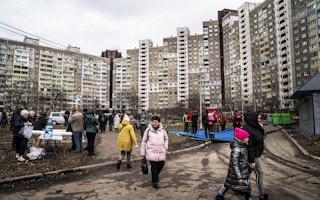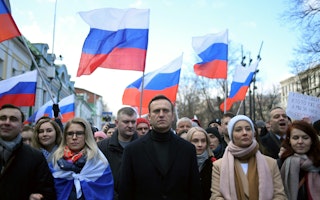Under Russian Occupation, Crimean Tatars Face a Campaign of Erasure
By Alim Aliev

I am a Crimean Tatar, but I was born thousands of miles away to the east, in Central Asia. That is because, 80 years ago this year, my grandparents and 200,000 more Crimean Tatars were brutally expelled from their homes by Stalin. As a young child, I returned with my family to Crimea; only to be driven out again after Russia’s seizure of the territory in 2014, 10 years ago. My family’s story is part of a recurring pattern of exile familiar to all Crimean Tatars that has continued from the eighteenth century up to the present day. As we mark these grim anniversaries, what can be done to restore the rights and dignity of this persecuted Indigenous people?
Hastened by the full-scale invasion of 2022, Ukraine has been busy disentangling itself from the legacy of Russian imperialism by reclaiming streets named after our oppressors, dismantling their monuments and embracing the Ukrainian language. But while most of the country continues this journey of decolonization, occupied areas like Crimea are being actively recolonized by Russia. Before the first annexation by the Russian Empire in 1783, the peninsula’s population was 95 percent Crimean Tatars. Nowadays, it is 13 percent and falling. Hundreds of thousands of Russians have been encouraged to settle in the territory.
In September 2021, Russian authorities detained my friend Nariman Dzhelyal on fabricated terrorism charges and sentenced him to 17 years in jail. It is no coincidence that the previous week Nariman—deputy leader of the outlawed Crimean Tatar assembly, the Mejlis—made a speech at the inaugural Crimean Platform summit in Kyiv. His imprisonment is just one of five thousand human rights violations we have recorded in the last decade, part of the wave of repression that has forced more than 70,000 people to flee. The intent is clear—to erase the history of Crimean Tatars, claim the land has always been Russian, and deny Ukraine’s territorial integrity.
Half of the Crimean Tatar people died during the Soviet deportations; now, Moscow is making the homeland uninhabitable for their descendants. Any expression of Crimean Tatar identity or even the mildest criticism of the government is met with arbitrary arrest, torture, and imprisonment. Crimean Tatars comprise of more than two-thirds of Crimea’s 200 political prisoners. Independent media has been banned, cultural initiatives are prohibited, and public gatherings broken up. Ten years of occupation has turned a vibrant, multicultural international tourist destination into a bleak, repressive garrison state where missiles are launched toward Ukrainian homes and infrastructure. The militarization extends to the mind as children are brainwashed by the Russian curriculum and cajoled into fighting in Ukraine, while children abducted in Ukraine are taken to Crimea.
Had the world delivered a more robust response to the seizure of Crimea by Russian forces in 2014, then Putin may have thought twice about launching a full-scale assault on the whole country eight years later. Instead, the Kremlin continues to work to eradicate the history, identity, and culture of the peninsula’s Indigenous communities. But it is never too late to help a beleaguered population battling an ongoing genocide, and there are some practical measures that can and must be taken.
Anyone overseeing or supporting the continuing illegal occupation of Crimea should be brought to justice. Some sanctions have been applied to individuals and sectors, but they are not always rigorously enforced. In 2020, the UK government imposed sanctions on a former mayor of occupied Sevastopol, only for him to be arrested in 2024 at his house in London apparently having acquired British citizenship. In March 2024, German prosecutors charged five people with exporting gas turbines to Crimea, though initial reports had emerged back in 2017. Sanctions must be widened, strengthened, and monitored.
The world should not stay silent. The international community must step up pressure on Russian authorities to immediately release Crimean political prisoners including Nariman Dzhelyal and his co-defendants and fellow activists Aziz and Asan Akhmetov who have been illegally transferred to a Siberian penal colony. Leaders—particularly across the Muslim world—should condemn the raiding of mosques as well as the harassment and detention of imams and worshippers. More governments should join Canada and a handful of other states in recognizing the Soviet-era expulsions of Crimean Tatars as an act of genocide.
Ukraine’s allies should deepen their support to human rights defenders, civil society organizations, artists, and journalists both in Crimea and among the exiled communities. Legal organizations are monitoring human rights violations and providing representation for the growing ranks of Crimean Tatars targeted by the Russian regime. Crimean Tatar TV and radio outlets broadcasting from free Ukraine into occupied territories can be a lifeline for subjugated peoples. Grassroots groups are assisting internally displaced Crimean Tatars across Ukraine with economic, practical, and psychological support.
Crimea is a template for the kind of repression, ethnic cleansing, and historical erasure Russia is imposing on Ukraine’s other occupied territories in Donetsk, Luhansk, Kherson, and Zaporizhzhia. Stalin justified the expulsion of the Crimean Tatar people on the grounds that some had collaborated with the German Nazi occupation of the region. In fact, most deportees were women, children, and the elderly; many of the absent men were fighting for the Soviet Union. Today, Putin has revived Nazi smears to dehumanize Ukrainians and justify his monstrous war. Ultimately the most effective guarantor of Crimean Tatars’ survival is the Ukrainian Army; democratic countries must maintain their support for Ukraine and not repeat the same appeasement that has led Crimea, and the world, down such a dark path.
Alim Aliev is a journalist, essayist, human rights activist, deputy director of the Ukrainian Institute, and member of the board of the International Renaissance Foundation.


